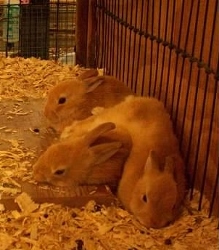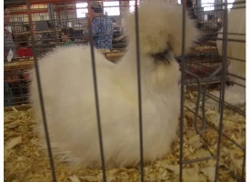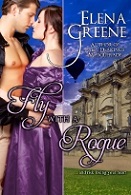 A few weeks ago I went to the New York State Fair. It’s become something of a ritual for my family; there are things we must do every time we go.
A few weeks ago I went to the New York State Fair. It’s become something of a ritual for my family; there are things we must do every time we go.
We eat lunch and dinner at the International Building, each getting different things and sharing. Sushi, falafel, pierogies…yum.
We always visit the Poultry Barn, where my youngest and I play a game she started as a toddler. Can we buy a (chicken, duck, bunny, racing pigeon)? My answer is just “No.”
 We catch a little of whatever is going on in the equestrian arena in the Toyota Coliseum. This year it was six hitch Belgians and later, Percherons driven “unicorn” fashion (two behind, one in front). Gorgeous beasts, all of them.
We catch a little of whatever is going on in the equestrian arena in the Toyota Coliseum. This year it was six hitch Belgians and later, Percherons driven “unicorn” fashion (two behind, one in front). Gorgeous beasts, all of them.
Besides those things, we wander the various exhibition halls and watch whatever performers happen to be on, check out the sand and butter sculptures, etc… We end the day watching the parade and eating funnel cake.
 Fairs in England started out as agricultural events: opportunities to buy and sell livestock. Entertainment was also important, but by the late eighteenth century it was a major focus of the “Fringe Fairs” around London, which included Greenwich, where I had the hero of Fly with a Rogue do a balloon ascension.
Fairs in England started out as agricultural events: opportunities to buy and sell livestock. Entertainment was also important, but by the late eighteenth century it was a major focus of the “Fringe Fairs” around London, which included Greenwich, where I had the hero of Fly with a Rogue do a balloon ascension.
Here are some descriptions of Greenwich Fair from Sketches from Boz, Chapter 12 by Charles Dickens, 1836. According to other sources, his descriptions were valid for the Regency. He describes the entertainment, which included itinerant theatres, Wild Beast Shows, exhibitions of dwarfs and the like, and dancing at the Crown & Anchor.
Imagine yourself in an extremely dense crowd, which swings you to and fro, and in and out, and every way but the right one; add to this the screams of women, the shouts of boys, the clanging of gongs, the firing of pistols, the ringing of bells, the bellowings of speaking-trumpets, the squeaking of penny dittos, the noise of a dozen bands, with three drums in each, all playing different tunes at the same time, the hallooing of showmen, and an occasional roar from the wild-beast shows; and you are in the very centre and heart of the fair.
And here’s a bit on the food:
The entrance is occupied on either side by the vendors of gingerbread and toys: the stalls are gaily lighted up, the most attractive goods profusely disposed, and unbonneted young ladies, in their zeal for the interest of their employers, seize you by the coat, and use all the blandishments of ‘Do, dear’—‘There’s a love’—‘Don’t be cross, now,’ &c., to induce you to purchase half a pound of the real spice nuts, of which the majority of the regular fair-goers carry a pound or two as a present supply, tied up in a cotton pocket-handkerchief. Occasionally you pass a deal table, on which are exposed pen’orths of pickled salmon (fennel included), in little white saucers: oysters, with shells as large as cheese-plates, and divers specimens of a species of snail (wilks, we think they are called), floating in a somewhat bilious-looking green liquid.
I remember the hero of Georgette Heyer’s Fridays’s Child taking the heroine to a fair, but off the top of my head, I can’t remember other fairs in Regency romance. It wasn’t an especially proper thing to do, and could get a bit rowdy. Not to say that people of the gentry or aristocracy couldn’t go, but they’d plan accordingly.
Do you enjoy county or state fairs? What’s your favorite thing to do (or eat) there?
 But before we discuss, here are the winners of the paperback version of Fly with a Rogue:
But before we discuss, here are the winners of the paperback version of Fly with a Rogue:
Bonnie
Kathy
Stella
Sheila C
Mary C
Please send your snail mail address to elena @ elenagreene.com. Thanks for visiting!

